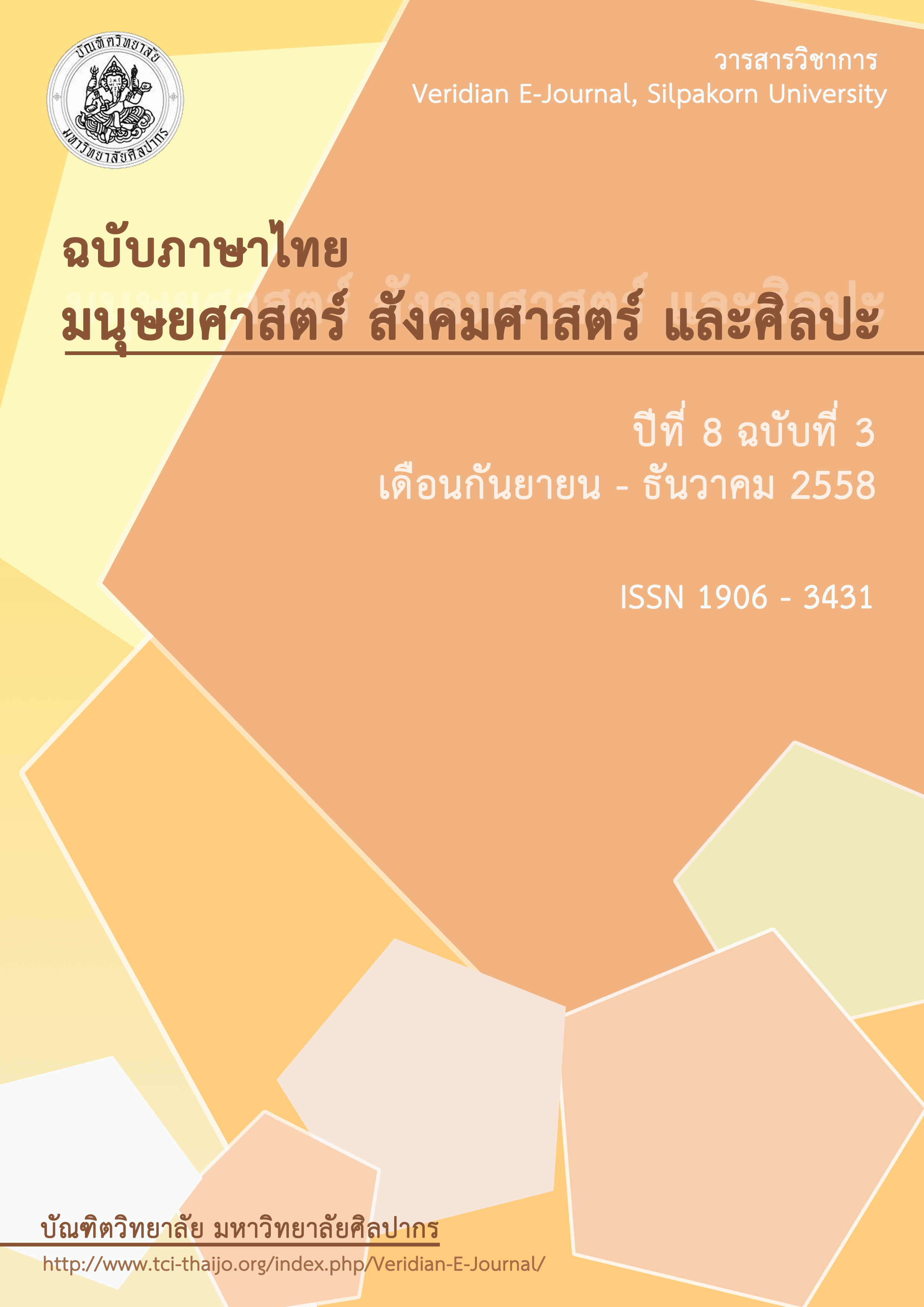รูปแบบการมีส่วนร่วมของผู้มีส่วนได้ส่วนเสียทางการศึกษาในการสร้าง บทเรียนภูมิปัญญาท้องถิ่นด้านวิทยาศาสตร์ของจังหวัดเพชรบุรี
Main Article Content
บทคัดย่อ
บทคัดย่อ
การวิจัยในครั้งนี้มีวัตถุประสงค์เพื่อสร้างรูปแบบการมีส่วนร่วมของผู้มีส่วนได้ส่วนเสียทางการศึกษาในการสร้างบทเรียนภูมิปัญญาท้องถิ่นด้านวิทยาศาสตร์ของจังหวัดเพชรบุรี กลุ่มตัวอย่างที่ใช้ในการวิจัย ได้มาจากการเลือกแบบเจาะจงโดยมีเหตุผลในการเลือก คือ เป็นผู้ที่ยินดีให้ข้อมูลกับผู้วิจัย หรือเป็นผู้ที่มีความรู้ด้านวิทยาศาสตร์ หรือมีความรู้เกี่ยวกับภูมิปัญญาท้องถิ่นของจังหวัดเพชรบุรี ซึ่งมีภูมิลำเนาใน 8 อำเภอของจังหวัดเพชรบุรี รวมทั้งหมด 37 คน ได้แก่ ครู 8 คน ประชาชน 9 คน นักศึกษา 20 คน มีการดำเนินการวิจัยใน 2 ขั้นตอน ได้แก่ 1) การศึกษาวิจัยเอกสาร (Documentary Research) ที่เกี่ยวข้องกับรูปแบบ แนวคิดการมีส่วนร่วม และภูมิปัญญาท้องถิ่น 2) การสร้างรูปแบบการมีส่วนร่วมของผู้มีส่วนได้ส่วนเสียทางการศึกษาในการสร้างบทเรียนภูมิปัญญาท้องถิ่นด้านวิทยาศาสตร์ของจังหวัดเพชรบุรี เครื่องมือที่ใช้ในการวิจัย ได้แก่ แบบสัมภาษณ์แบบมีโครงสร้าง และการประชุมสนทนากลุ่ม วิเคราะห์ข้อมูลโดยใช้การวิเคราะห์เนื้อหา
ผลการวิจัย พบว่า รูปแบบการมีส่วนร่วมของผู้มีส่วนได้ส่วนเสียทางการศึกษาในการสร้างบทเรียนภูมิปัญญาท้องถิ่นด้านวิทยาศาสตร์ของจังหวัดเพชรบุรี ประกอบด้วย 5 ขั้นตอน ได้แก่ 1) การมีส่วนร่วมคิดร่วมตัดสินใจ โดยผู้มีส่วนได้ส่วนเสียทางการศึกษาได้มาประชุมร่วมกันในการกำหนดความต้องการ การสำรวจ และจัดลำดับความสำคัญของภูมิปัญญาท้องถิ่นในแต่ละอำเภอ 2) การมีส่วนร่วมในการวางแผน ด้วยการอนุรักษ์เพื่อรักษาภูมิปัญญาท้องถิ่นของแต่ละท้องถิ่นไว้ให้คงอยู่ และมีวิธีการถ่ายทอดภูมิปัญญาท้องถิ่นให้ประสบความสำเร็จผ่านการให้ประสบการณ์จริงและร่วมทำกิจกรรมภูมิปัญญาต่างๆ ของท้องถิ่น 3) การมีส่วนร่วมในการดำเนินงาน ด้วยการกำหนดหน่วยงานหลักและการส่งเสริมของหน่วยงานต่างๆ ในการขับเคลื่อนการนำภูมิปัญญาท้องถิ่นไปใช้ โดยจัดเป็นหลักสูตรท้องถิ่นในสถานศึกษา เพื่อให้นักเรียนได้ศึกษาและสืบทอด4) การมีส่วนร่วมติดตามและประเมินผล ด้วยการมีแนวทางการติดตามผลและส่งเสริมการถ่ายทอดภูมิปัญญาทองถิ่น ควรมีการกำหนดผู้ติดตามและจัดตั้งหน่วยงานที่ทำการประเมินผล และ 5) การมีส่วนร่วมรับผลประโยชน์ นักเรียนและครูได้รับความรู้เพิ่มเติมเกี่ยวกับภูมิปัญญาท้องถิ่น ผู้บริหารนำภูมิปัญญาท้องถิ่นมาเป็นจุดเด่นสร้างศูนย์การเรียนรู้ สถานศึกษามีนิทรรศการ มีแหล่งเรียนรู้ในท้องถิ่น มีนักท่องเที่ยวมาเที่ยวชมและประชาชนในท้องถิ่นมีรายได้
Abstract
The purposes of this research were to create participation model of educational stakeholders in formulating science local wisdom lesson of Phetchaburi Province. The 37 samples used in this research, purposively selected with proper reasons, were voluntary informants, or persons with scientific knowledge or knowledge on Phetchaburi local wisdom living in 8 districts of Phetchaburi Province consisting of 8 teachers, 9 people, and 20 students. The research was done in 2 steps, i.e., 1) documentary research on model and concept of participation and local wisdom, and 2) creation of participation model of educational stakeholders in formulating science local wisdom lesson of Phetchaburi Province. The instruments were structured interview form and focus group discussion. The statistics used in the study were content analysis.
The results were as follows:
Participation model of educational stakeholders to formulate science local wisdom lesson of Phetchaburi Province consisted of five stages: 1) decision making: educational stakeholders meeting for setting needs, survey, setting priority of local wisdom of each district, 2) planning: conserving local wisdom of each community and having successful method for transferring local wisdom by means of real experience and various activities of community, 3) implementation: determining core working units and their promotion in mobilizing implementation of local wisdom by developing school curriculum for students in studying and continuation of local wisdom, 4) monitoring and evaluation: having approaches for monitoring and promoting local wisdom transfer, determining persons responsible for monitoring, and establishing units for evaluation, and 5) benefit receiving: the students and teachers gaining more knowledge on local wisdom, administrators applying local wisdom as an outstanding point in creating learning centers, schools having exhibitions and local learning centers, and tourists coming into community resulting in local people’s more income.

